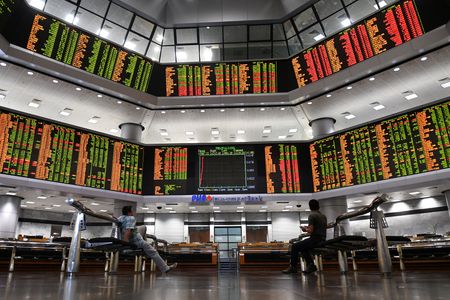By Rae Wee and Tom Westbrook
SINGAPORE (Reuters) – Malaysia’s share market and ringgit currency weakened on Monday, after a national election over the weekend resulted in the country’s first hung parliament, with investors nervous about the prospect of more instability and uncertainty over policies.
The ringgit was heading for its worst day in about six weeks, dropping 0.5% to 4.57 per dollar.
Kuala Lumpur’s main stocks index closed just 0.1% lower at 1,447.96, after sliding more than 1% in early Asia trade.
Casino operator Genting Malaysia and investment holding and management company Genting Berhad led the losses, as investors worried that the strong performance from the Islamist party PAS could lead to a crackdown on gambling.
The ruling Barisan Nasional, led by the United Malays National Organisation (UMNO), came a distant third in the election, behind opposition leader Anwar Ibrahim’s multi-ethnic bloc and another bloc led by former prime minister Muhyiddin Yassin, but dominated by PAS.
Neither opposition group won enough seats to govern alone.
And while they competed to form alliances that could deliver the necessary majority, the royal palace extended a deadline for parties to submit the name of a lawmaker that they think has majority to 2 p.m. local time (0600 GMT) on Tuesday.
“This is not ideal for Malaysia, which has been dealing with political challenges for some time now,” said Trinh Nguyen, emerging Asia economist at Natixis in Hong Kong.
“The results confirm the concern that even if a coalition is formed, no ruling party means it is very hard to move forward decisively, as politics is now taking precedent over economics.”
Anwar’s multi-ethnic coalition won the most number of seats in Saturday’s election with 82.
Muhyiddin’s conservative Malay Muslim alliance took 73 seats, but then secured support from two smaller blocs, giving it control of 101 – still short of the 112 needed for a majority.
Leaders of the vanquished Barisan Nasional were engaged in talks with various suitors before deciding where to pledge their support, Anwar said after meeting BN leaders.
RISING UNCERTAINTY
The inconclusive result, for a country which has already had three prime ministers in as many years, risks delaying policy decisions and complicating hoped-for reform and fiscal repair.
“A lot hinges on who will form the next government,” said Khoon Goh, head of Asia research at ANZ in Singapore, with focus on who becomes finance minister and whether they have the political will to rein in subsidies or broaden the tax base.
While Malaysia’s economy expanded at its fastest pace in over a year in the third quarter, the world’s second-biggest palm oil producer remains vulnerable to shifts in commodity prices and to manufacturing competition from regional rivals.
Bonds, wary of the effect of promises to cushion living costs on the national accounts, came under pressure and benchmark 10-year yields rose over 10 basis points to 4.398%, while investors were also watchful of the rise of PAS.
“There is a question mark that is triggered by this rise of ethno-religious politics in Malaysia, with longer term implications for economic and social policy,” said Alvin Tan, head of Asia FX strategy at RBC Capital Markets in Singapore.
PAS won 49 seats, the most of any single party and is the largest component of Muhyiddin’s Perikatan Nasional bloc, and analysts at Maybank said its strength in state legislatures could lead to a clampdown on gaming or drinking.
Heineken Malaysia shares fell more than 6% in their steepest drop for more than two years. Carlsberg Malaysia shares fell 5%. Shares in lottery operator Magnum fell 8.7% to a 13-year low and shares of rival Sports Toto hit a 24-year low. Genting Malaysia shares fell more than 5%.
“Business and religion generally do not mix well,” Maybank’s analysts said.
(Reporting by Rae Wee and Tom Westbrook; Editing by Simon Cameron-Moore)

